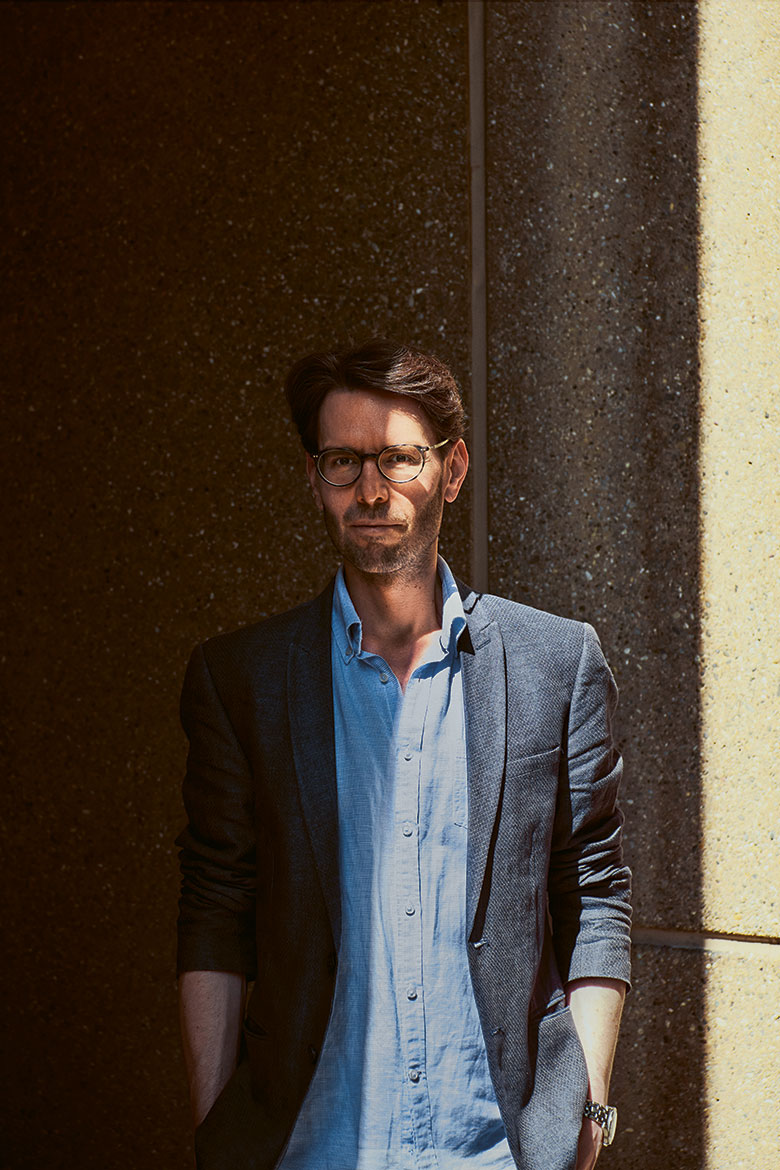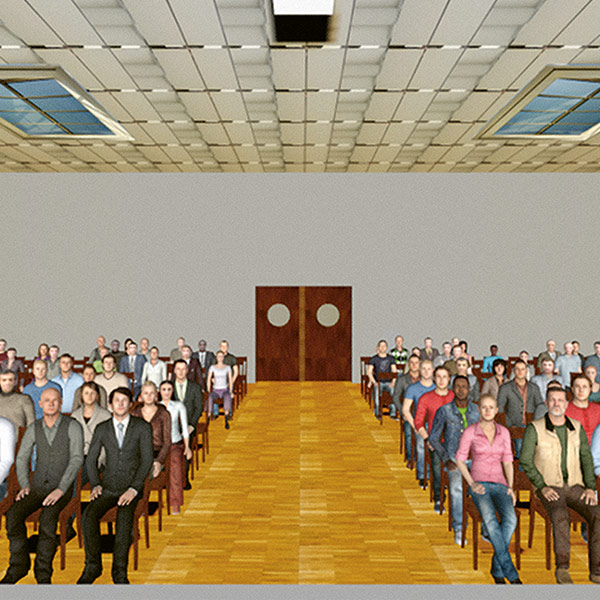Portrait
Watching TV with Nietzsche
Stéphane Boutin is a literary scholar who’s analysed conflict in popular American TV series from the 2000s. A year ago, he wrote an essay in which he made public his diagnosis with Parkinson’s disease. We take a closer look at the story of a young man who reflects intensely on everything he observes.

Stéphane Boutin spent many nights watching The Sopranos, Mad Men and Lost – all in the name of scholarship. | Photo: Flavio Leone
Essays by researchers rarely manage to strike a chord with a wide spectrum of readers, let alone trigger letters to the editor. But Stéphane Boutin did this in May 2024 with a candid, personal essay for the ‘Das Magazin’ supplement of the Tages-Anzeiger newspaper about his recent diagnosis of Parkinson’s disease, how it’s changed him, and how it’s altered his view of the world.
He also discussed the current state of research into the causes of Parkinson’s and where information is still lacking – such as the possible impact of neurotoxic chemicals in pesticides. “I received dozens of e-mails”, he says. Old school friends wrote to him, as did neighbours and other people who’ve been affected by the disease. “The feedback I got revealed just how widespread Parkinson’s is, and how often people conceal having it”.
Inspired by Karl May
Boutin was also able to touch people because he writes in a manner that’s accessible. When he was a child, his fascination with writing was triggered by the German novelist Karl May (1842–1912), who was famous for tales set in the Wild West and other faraway locations.
Today, admittedly, Boutin takes a more critical view of the exoticism and colonialism that we find in May’s books. “But May was a pioneer of serial storytelling. In his cycles, such as those set in the Far East, we find recurring patterns that help the story to keep moving forwards”. Later, he discovered Stephen King. And when he attended high school in Zurich Enge, it was Max Frisch who fascinated him. It was also the latter who sparked his interest in philosophy, which in turn led to his decision to study this subject at the University of Zurich.
It was there that Boutin attended lectures by Elisabeth Bronfen, a professor of English and American literature who also studies Hollywood films and TV series such as ‘Mad Men’. “She showed us that you can read and analyse films just like you can books in order to reveal underlying motifs and structures”, says Boutin. These lectures took place not long after several American TV series had been produced – like ‘The Sopranos’ – that became a cultural phenomenon, reaching an international audience of millions.
In his doctoral thesis, Boutin ultimately analysed four popular American TV series that were broadcast from the late 1990s to the early 2000s: ‘The Sopranos’, ‘The West Wing’, ‘The Wire’ and ‘Lost’. “Each series has a running time of between 60 and 100 hours. That’s an enormous amount of material!”
From intense violence to liberal discourse
Boutin worked on his thesis for nearly ten years, during which time his focus on the topic shifted. That meant he had to watch all the seasons twice – an almost impossible task alongside his work as a research assistant at the German Department of the University of Zurich. He finally committed his findings to paper during the Covid years of 2020 and 2021, when a scholarship he was awarded enabled him to concentrate on his thesis. He’d watch one or two episodes an evening, take notes, then write down his impressions and reflections the next day.
Boutin examined how conflicts are depicted in the series, then developed typologies for how they are handled. In ‘The Sopranos’, for example, Boutin says that conflict remains unspoken and has to be suppressed repeatedly by highly violent means. The situation is very different in ‘The West Wing’, where disagreements are domesticated through discourse and negotiated between the protagonists according to liberal, democratic ideals.
Boutin’s core point of reference for his theoretical and philosophical cultural analyses of TV series was the work of Friedrich Nietzsche, in particular his model of agonistic conflict that describes the tension between two opposing forces – such as two characters engaged in a dispute – or two opposing ideas. “Nietzsche’s works are often like a laboratory in which he’s trying out different agonistic patterns”.
For example, Boutin sees ‘Lost’ as a redemption narrative that follows patterns similar to those he’s found in Nietzsche’s own works. “I was fascinated by this link between the philosophy of the late 19th century and the TV series of the 2000s”.
People with tremors everywhere
Today, Boutin has mixed feelings when he looks back on the ten years that he spent on his doctoral thesis. He has happy memories of his in-depth engagement with Nietzsche, serial storytelling and passing on knowledge to the next generation as an assistant at the university. “But the pressure to publish and the normality of working on evenings and weekends is difficult to reconcile with starting a family”.
Boutin also had friends who suffered complete burnouts even before completing their doctorate. “I still ask myself whether the competitive mechanisms in our academic system really promote quality”. It was while he was still working on his thesis that Boutin decided against pursuing an academic career. Today, he works as a study programme coordinator at the University of Zurich.
Boutin didn’t get his Parkinson’s diagnosis until after he’d finished his doctorate in 2023. “I don’t know when the first changes set in, nor if the dopamine deficiency caused by the disease was a factor in my decision”. But his chronic illness changed his view of society. Everywhere he looked, he now saw people with the tremors that are typical of Parkinson’s, or people who moved in the strange, slow fashion that is a consequence of the deterioration of the brain cells that produce the neurotransmitter dopamine.
He experienced the healthcare system as being geared towards the needs of those he terms the “chronically healthy”. “When you’re on prescription medication, you have to pay regular own-risk deductibles, plus high premiums to ensure that your deductibles stay low. That’s all stuff you have to be able to afford”.
Creativity and coordinating
Stéphane Boutin was born in Kilchberg in the canton of Zurich in 1984. He studied philosophy, German literature and political sciences at the University of Zurich. He wrote his doctoral thesis on crisis narratives in TV series while also working as a research assistant at the German Department of the university.
Boutin is a music lover, and from 2004 to 2014 he worked as a copywriter, project manager and board member at the music label ‘kuenschtli.ch’, where he also made his first forays into social media. From 2021 to May 2025, he was the Instagram content manager for the Nietzsche House in Sils Maria. Since February 2025, Boutin has been working as the study programme coordinator for general and comparative literature at the Department of Romance Studies at the University of Zurich, where his responsibilities include study administration and counselling, curriculum planning and communication. He lives with his partner and son in Zurich.
Stéphane Boutin recently attended a reading by the South Tyrolean poet Oswald Egger at the Literaturhaus in Zurich. “Suddenly, in the middle of the reading, I noticed that my tremors had disappeared. My left leg and left hand were suddenly quite still”, he says. “It seems that the sound of poetry can create feelings of happiness and relaxation”. He has similar experiences when playing and listening to the piano; that too does him good.
He watches TV series less frequently these days. “User behaviour is now analysed in real time during streaming, and the knowledge gained when people switch off is incorporated into the next season”. Boutin here sees an analogy with Nietzsche’s notion of eternal recurrence: “Our everyday, small-scale behaviour helps to shape the structural patterns in which supra-individual processes become established over the long term. To put it another way, the series that we click on each evening are the ones that are reproduced on a large scale”.
But this doesn’t mean he’s become a cultural pessimist. The ‘click economy’ has also brought about a significant expansion of the offerings for certain subcultures. “That’s a positive development”, says Boutin. It also means there’s now a wealth of material for a new generation of cultural and literary scholars to explore.



